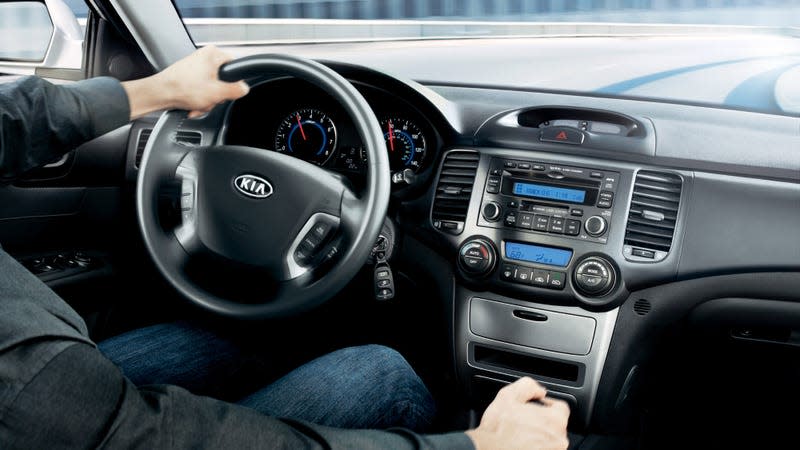The Morning Shift: Millions Of Kia Cars Could Have Dangerous Airbags

Good morning! It’s Thursday, June 1, 2023 and this is The Morning Shift, your daily roundup of the top automotive headlines from around the world, in one place. Here are the important stories you need to know.
1st Gear: Kia And ARC Automotive
On Wednesday, a newly released federal document placed the number of Kia vehicles equipped with airbags supplied by Knoxville-based ARC Automotive at almost 4 million, according to The Wall Street Journal. This is believed to be merely a fraction of the total number of affected cars, as the National Highway Traffic Safety Administration had asked ARC to recall some 67 million inflators in mid-May. ARC rejected the demand, stating that “extensive field testing has found no inherent defect.”
Read more
The number of Kia cars involved stems from a 2016 letter, during the early days of the NHTSA’s investigation, and impacts model years 2000 through 2016. A specific list of affected makes and models has not yet been published by regulators, so this information is especially valuable to owners. Courtesy WSJ:
Kia told the National Highway Traffic Safety Administration in December 2016 that nearly 4 million vehicles made by the car company over a 16-year period were equipped with air-bag inflators from Knoxville, Tenn.-based ARC Automotive, according to the document, which was posted on NHTSA’s website in recent days. [...]
A Kia spokesman didn’t have an immediate comment. The company previously said it is aware of and evaluating the situation involving NHTSA’s recall demand to ARC.
The disclosure of the 2016 letter is significant because to date, NHTSA hasn’t publicly released a comprehensive list of vehicle models and brands affected by the potentially hazardous part. NHTSA says the risk associated with the air-bag inflators, if left unaddressed, would lead to more incidents in the future.
The document was submitted by Kia in response to a request for information sent by NHTSA during the early part of its investigation into ARC’s inflators, which has been continuing for about eight years, one of the regulator’s longest ongoing safety-defect probes. Kia at the time said it was aware of only one incident involving an ARC inflator rupturing in one of its vehicles, according to the newly released document.
At the time of the letter, the lone incident involved a 2004 Kia Optima sedan. Its driver-side inflator ruptured during activation in 2014, injuring the driver’s face and legs. While a widespread recall across multiple makes has not yet occurred, GM has issued campaigns for four of its affected models, spanning the 2008 to 2017 model years. Until something changes, the onus is on automakers to initiate elective recalls.
2nd Gear: Seven More Years For EV Cost Parity
Electric car prices may not fall enough to rival those of gas-powered cars until 2030, Ford CEO Jim Farley predicted during a meeting with shareholders Wednesday. From Reuters:
At an investor conference, Farley said that, for many automakers, EVs will remain more costly than their internal combustion engine counterparts until the second and third generation models go into production later in this decade.
Analysts have predicted that EV cost parity could come as soon as 2025.
Between 2030 and 2035, Farley added, much of the industry’s EV cost savings will come from “dramatically lower labor content” because the vehicles will be simpler to build with fewer parts, and will be fitted with smaller batteries that use cheaper materials.
He also predicted the industry could realize lower distribution costs from selling EVs online, as well as higher revenue from new software-driven digital services.
Farley also believes consolidation and cooperation between automakers and suppliers will ramp up in the coming years, mere days after Ford announced a plan to adopt Tesla’s charging standard.
3rd Gear: Today In Lucid
Lucid’s cars are too expensive, the company is producing too few of them and it can’t afford to pay all its employees. Times are indeed tough, which is why the company is leaning once again on its friends at Saudi Arabia’s Public Investment Fund (PIF) to keep it afloat. On Wednesday, Lucid announced plans to raise $3 billion — more than half of which will come from the country, which is already the startup’s majority shareholder by a significant margin. Per Reuters:
PIF, which owns more than 60% of the company, has agreed to buy 265.7 million shares in a private placement for about $1.8 billion, Lucid said, implying a price of about $6.80 per Lucid share, compared with the stock’s Wednesday close of $7.76.
The remainder will be raised from a public offering of 173.5 million shares of common stock.
The additional funds are critical and come as the automaker, like its peers, struggles with mounting losses and tightening cash reserves amid recession fears and a price war sparked by market leader Tesla Inc.
“The secondary offering will probably be ok as there’s a lot of ESG dollars looking for investments,” said Louis Navellier, chief investment officer at money management firm Navellier, which has made EV and related investments but has stayed away from Lucid.
“That, along with money from the Saudis, will ensure Lucid survives a couple of more years. But their burn rate needs to fall fast. There’s a glut of EVs for sale in the U.S. and competitors are cutting prices and offering discounts,” he said.
Lucid’s stock price fell 9 percent after hours following the news.

 Yahoo Autos
Yahoo Autos 